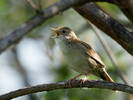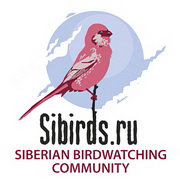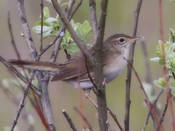search
classification
|
basic information
|
Western Grasshopper Warbler
Locustella naevia (Boddaert, 1783)

|

|
|
|
2013-06-15
Pristan Pochta, Novosibirskaya Oblast. |
© Sergey Pisarevskiy
|
|
Description
Adult Grasshopper Warblers in spring and summer have olive-brownish upperparts with dark-brown core-streaks. Pale supersillium is slightly visible. Flight and tail feathers are dark-brownish. Outer webs of flight feathers have olive-brown edges, tail feathers sometimes are slightly barred and with pale tips. Underparts are pale-clay, whitish on throat and belly, sometimes with dark-brownish streaks on breast. Underwing coverts are pale-buff of whitish. In fresh autumn plumage the upperparts have deep olive tinge; underparts are yellow toned. Bill is dark-brown with pale low mandible; legs are pale, pink-yellowish; eyes are light-brown. Juveniles have yellow-olive tinged upperparts; underparts have slightly green-yellowish tone and sharp dark streaks on breast. Some individuals have streaks and yellowish tone on underparts even after the first spring moulting. Sizes: wing 54-61 mm. Weight: 9.7-15.3 grams.
Biology
Grasshopper Warbler is common breeding migrant. It inhabits meadows and marshes with tall grass, bushes and reeds, both on plains and in mountains up to 1700-2700 m. On migration occurs in grass and bushes near rivers, lakes and ponds, in tall weed thickets and man-made forests. Arrives mid-April - early May in southern areas (where latest migrants recorded in end May - mid-June), and in mid - end May in northern ones. Breeding in separate pairs, not close each to other. Nest built on ground under grass, dry reed heap or bush from dry grass lined with thin grass and hair. Clutches of 4-7, usually 5-6 eggs is founded in the end of May - late June. Both parents feed juveniles, which fledge at 10-11 days old, in end June - late July. Autumn migration begins from mid-July, most leave in August, latest recorded end September - early October.
References










